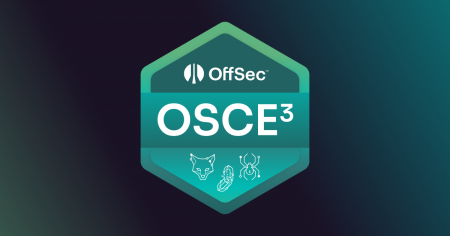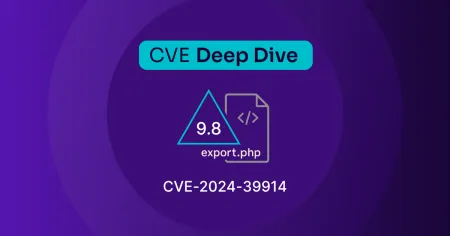
Jun 21, 2023
An Overview of OffSec’s OSCE³ Certification: The Ultimate Achievement in Offensive Security
The OSCE³ certification demonstrates mastery of offensive security skills and techniques. Here’s an overview of each course and the benefits of achieving the OSCE³ certification.
The value of a professional certification extends beyond the tangible benefits of job advancement and increased compensation. Particularly in the field of cybersecurity, the importance of skill improvement, respect, and job satisfaction is paramount. According to a recent CyberEdge report, IT security professionals view certifications as a path to expanded knowledge, increased credibility, and improved job satisfaction.
With this backdrop, OffSec is proud to feature our OSCE³ (OffSec Certified Expert³) certification, a testament to exceptional mastery in the offensive security domain. This certification is automatically awarded at no additional cost upon successful completion of our three advanced courses and passing their respective exams: Advanced Web Attacks and Exploitation (WEB-300), Advanced Evasion Techniques and Breaching Defenses (PEN-300), and Windows User Mode Exploit Development (EXP-301). The OSCE3 is a symbol of determination, knowledge, and skill.
This blog post will provide a high-level overview of each course, highlighting their significance and the benefits of achieving the OSCE³ certification. Whether you’re a seasoned professional or just starting your cybersecurity journey, this will provide insight into the value of the OSCE³ certification for your career.
Course #1: Advanced Web Attacks and Exploitation (WEB-300) and OSWE Certification

Advanced Web Attacks and Exploitation (OffSec Web Expert)
In today’s complex digital landscape, with web applications presenting an increasingly tempting target for cyber adversaries, equipping oneself with advanced web application penetration testing skills is critical. At OffSec, our WEB-300 course is comprehensively structured to benefit not only penetration testers but also software security professionals and full-stack developers, strengthening their cybersecurity expertise.
WEB-300 is an intensive exploration into the world of white-box assessments. Within this course, you’ll systematically examine large codebases, discovering vulnerabilities like SQL injection, Cross-Site Scripting (XSS), and remote code execution. By prioritizing practical, real-world situations and hands-on learning, WEB-300 ensures you’re well-prepared to identify and mitigate cybersecurity threats in large-scale software environments.
By completing WEB-300, and earning the OSWE certification by passing the associated 48-hour proctored exam, you’ll be able to showcase your proficiency in secure code, exposure to web frameworks and coding practices, and preparation for real-world situations.
Key areas of study in the WEB-300 course include:
- Advanced information gathering and enumeration
- Web application vulnerability identification and exploitation
- Advanced client-side and server-side attacks
- Web application post-exploitation techniques
- Web application vulnerability chaining
Course #2: Advanced Evasion Techniques and Breaching Defenses (PEN-300) and OSEP certification

Advanced Evasion Techniques and Breaching Defenses (OffSec Experienced Pentester)
Our PEN-300 course is an essential milestone on your offensive security path, taking you deep into advanced penetration testing techniques. This course doesn’t just teach you; it equips you with the tools and tactics to evade and breach defenses effectively. The real-world applications of these skills are as vast as they are vital in the evolving landscape of cybersecurity.
In the immersive environment of PEN-300, you delve into key areas such as antivirus evasion techniques, lateral movement strategies, domain fronting and proxying, code injection and process manipulation, post-exploitation activities, and privilege escalation. This comprehensive exposure ensures our learners can confidently navigate the intricacies of modern security measures, carrying out penetration tests with precision and effectiveness.
Upon successfully completing PEN-300 and earning the OSEP certification through the associated 48-hour proctored exam, you will have demonstrated your proficiency in conducting advanced penetration tests, circumventing network security mechanisms, and effectively tackling security scenarios in well-established organizations.
Reflecting on their experience with PEN-300, a recent graduate shared, “I have already been able to apply the fundamentals learned in PEN-300 in my day-to-day work and have increased my skillset in a meaningful way.”
Key areas of study in the PEN-300 course include:
- Antivirus evasion techniques
- Lateral movement strategies
- Domain fronting and proxying
- Code injection and process manipulation
- Post-exploitation activities and privilege escalation
Course #3: Windows User Mode Exploit Development (EXP-301) and OSED Certification

Windows User Mode Exploit Development (OffSec Expert Developer)
Our EXP-301 course focuses on Windows user mode exploit development, an essential competency for advanced penetration testers, vulnerability researchers, and malware analysts. You’ll develop the expertise to tackle complex security challenges by learning to identify and exploit vulnerabilities such as buffer overflows, SEH overflows, and format string vulnerabilities. By completing the associated exam, you’ll earn the OSED certification, showcasing your expertise in Windows user mode exploit development.
The course also unravels advanced exploit techniques, including bypasses for Address Space Layout Randomization (ASLR) and Data Execution Prevention (DEP), ensuring you can navigate the multifaceted terrain of cybersecurity threats.
As you immerse yourself in the intricate world of exploit development, you’ll discover, like one of our learners, the blend of challenge and enjoyment from mastering these skills. They shared, “The OSED journey has been three months of intense sweat and tears, but overall, SO MUCH FUN and learning. Coming from a “bluey” background, I couldn’t imagine offensive tasks could be this fun. Everything I learned will be very helpful in my malware reverse engineer path.”
Indeed, the skills honed during any OffSec course aren’t just for passing an exam—they’re tools for enhancing your career and contributing to the broader cybersecurity community. You’re acquiring valuable, practical skills that can directly impact your job and cybersecurity at large. Moreover, upon completion, you join a prestigious network of OffSec alums and professionals who value continuous learning and knowledge sharing.
Key areas of study in the EXP-301 course include:
- Windows user mode exploit development
- Reverse engineering with IDA and WinDbg
- Bypassing ASLR and DEP protections
- Shellcode creation and optimization
- Crafting ROP chains and other advanced techniques
The OSCE³ Certification: Demonstrating Exceptional Mastery
Earning the OSCE³ certification showcases your dedication to the offensive security field and proves your ability to tackle complex security challenges. Any learner that completes the above three advanced courses and passes the associated exams will demonstrate exceptional mastery in web application attacks, advanced evasion techniques, and Windows user mode exploit development.
Benefits of achieving the OSCE³ certification:
- Recognition of expertise: The OSCE³ certification is a testament to your skills and knowledge in offensive security, distinguishing you as a top-tier offensive security professional.
- Enhanced career opportunities: With the OSCE³ certification, you’ll stand out in the job market, attracting lucrative opportunities in the cybersecurity field.
- Continued learning and growth: The OSCE³ certification is a stepping stone in your cybersecurity learning journey, opening doors to further exploration and knowledge acquisition.
- Exclusive challenge coin: Upon achieving the OSCE³ certification, you’ll receive a unique challenge coin, symbolizing your accomplishment and dedication to the field.

Earning an OSCE³ certification, as detailed in this blog post, underscores your elite capabilities as an offensive security professional. As mentioned, this prestigious qualification is achieved by successfully passing a series of rigorous exams associated with the courses we offer. The certification not only validates your advanced knowledge in the domain, but also solidifies your practical skills in applying offensive security tactics.
Take advantage of this opportunity to elevate your offensive security skills and boost your cybersecurity career. Enroll in our advanced courses (WEB-300, PEN-300 & EXP-301) today and embark on the journey towards the OSCE³ certification. You’ll not only gain cutting-edge knowledge and skills, but you’ll also join a leading group of cybersecurity professionals who are redefining the industry.
Ready to take your offensive security skills to the next level? OffSec courses are available through the Course and Cert Exam bundle, or through our Learn subscriptions.
Are you looking to train your team and improve your organization’s security posture?
Our cybersecurity workforce development solution is designed to help your team build the necessary skills to tackle advanced security threats and safeguard your organization’s most valuable assets.
Visit our OffSec Learn Enterprise page to explore our corporate training options and take the first step towards a more secure future.
Stay in the know: Become an OffSec Insider
Get the latest updates about resources, events & promotions from OffSec!
Latest from OffSec

Research & Tutorials
CVE-2024-39914 – Unauthenticated Command Injection in FOG Project’s export.php
Discover details about CVE-2024-39914, a critical unauthenticated command injection vulnerability in FOG Project ≤ 1.5.10.34. Learn how attackers can exploit export.php to execute system commands or deploy persistent webshells.
Jun 26, 2025
2 min read

OffSec News
What It Really Means to “Try Harder”
Discover how OffSec’s “Try Harder” mantra evolved into a mindset, and how it helps learners build grit, creativity, and real-world problem-solving skills.
Jun 23, 2025
7 min read

Research & Tutorials
CVE-2025-3248 – Unauthenticated Remote Code Execution in Langflow via Insecure Python exec Usage
CVE-2025-3248 is a critical RCE vulnerability in Langflow that allows unauthenticated attackers to execute arbitrary Python code via unsanitized input to exec(). Learn how it works and how to protect your system.
Jun 18, 2025
2 min read